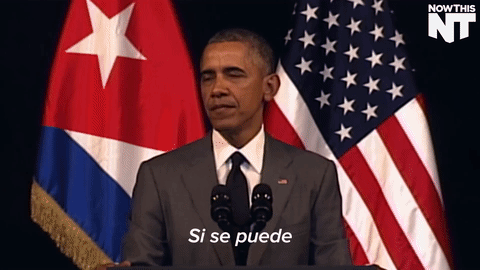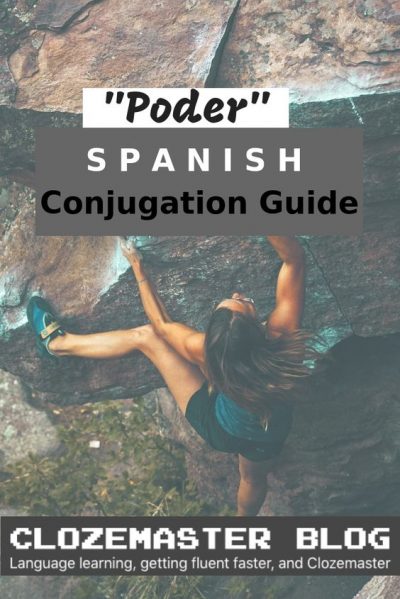
As a linguist, the Spanish verb poder always makes me weak at the knees and tremble in humility at how powerful (poderoso) it is!
This verb is in control! The meaning of poder in English translates to “can” or “be able to”, but it doesn’t stop there! It also expresses a world of future possibilities of what may, might or could happen. It can even describe magic powers!
In this guide to poder, we will cover everything you need to get plugged into this power source! You can expect:
- Conjugation tables of the Spanish verb poder with the most common tenses
- Example sentences of the verb poder with the most common tenses
- 6 different meanings of poder so you’ll get to know this verb inside and out!
Lo puede aguantar?
Can you handle it?
Let’s jump right in!
What is the verb poder?
The Spanish verb poder comes from the vulgar Latin word posere, which is where we get the word possess, such as “to possess an ability to do something”. Another word for ability is power. This is where we get the word poderoso (powerful) and poderes mágicos (magical powers!)
Other words we derive from poder include:
- possibility (posibilidad)
- potential (potencial)
- potent (potente)
- …and the most endearing of all, spouse (esposo), which also means handcuffs in Spanish
The key takeaway is if you can remember the words relating to poder in English, you’ll never forget all of its meanings in Spanish!
You’ll also be a hit at dinner parties (I wouldn’t know, I’m never invited…)
Poder: Spanish to English Conjugation with Examples
In this section, we will conjugate the Spanish verb poder in its most common tenses, starting first with the easy indicative tenses and then moving on to the more advanced subjunctive/perfect tenses. Then, we will give examples of each tense that you can actually use!
Poder Conjugation Spanish to English: Present, Preterite, Imperfect and Future
In this section, we will conjugate the present, preterite, imperfect and future tenses of poder, explain how they are used and give examples of each tense in action.
Note: There are multiple irregularities, including a stem change from o to ue in the present tense and a stem change in the future from er to r. For a refresher on irregularities in the future tense or present tense, check out our Spanish tense guides!
*Irregularities are in red
| Present | Preterite | Imperfect | Future | |
| yo | puedo | pude | podía | podré |
| tú | puedes | pudiste | podías | podrás |
| él/ella/Usted | puede | pudo | podía | podrá |
| nosotros | podemos | pudimos | podíamos | podremos |
| vosotros | podéis | pudisteis | podíais | podréis |
| ellos/ellas/usds | pueden | pudieron | podían | podrán |
Poder Present Tense Example
To express something you can or cannot do, or are simply unable to do.
“(Yo) no puedo salir hoy noche… tengo muchas tareas que hacer.”
I can’t go out tonight… I have a lot of homework to do.
“(Yo) no puedo hacer el check-in hasta las 15.”
I am unable to do the check-in until 3 PM.
Poder Preterite Tense Example
To express something you could not or were unable to do in a fixed moment in the past.
“Ayer (ella) no pudo ir a la escuela.”
Yesterday she wasn’t able to go to school.
“(Nosotros) no pudimos dormir anoche porque había mucho ruido.”
We couldn’t sleep last night because there was a lot of noise.
Poder Imperfect Tense Example
To express something that you could or were able to do over an indefinite period of time in the past.
“Cuando era niña, no podía pronunciar la r.”
When I was a little girl, I couldn’t pronounce “r”.
“Cuando vivíamos en el campo, podíamos correr descalzos.”
When we lived in the countryside, we could run barefoot.
Poder Future Tense Example
To express something that you will or will not be able to do in the future. It is usually used for more formal business situations.
“Si usted no se registra hoy, no podremos garantizar su plaza.”
If you do not register today, we will not be able to guarantee your spot.
“Una vez que estemos todos juntos, podremos empezar.”
Once we are all together, we will be able to start.
Poder Conjugation Spanish to English: Subjunctive Present, Subjunctive Imperfect, Conditional and Perfect Present
In this section, we will conjugate the subjunctive present, subjunctive imperfect, conditional and perfect present tenses of poder, explain how they are used, and give examples of each tense in action.
*Irregularities are in red
| Subjunctive Present | Subjunctive Imperfect | Conditional | Perfect Present | |
| yo | pueda | pudiera | podría | he podido |
| tú | puedas | pudieras | podrías | has podido |
| él/ella/Usted | pueda | pudiera | podría | ha podido |
| nosotros | podamos | pudiéramos | podríamos | hemos podido |
| vosotros | podáis | pudierais | podríais | habéis podido |
| ellos/ellas/usds | puedan | pudieron | podrían | han podido |
Poder Subjunctive Present Tense Example
To describe desires, doubts, wishes and possibilities about whether someone can or cannot do something. In the first example, doubt is being expressed. In the second, desire.
(For help with the Spanish Present Subjunctive, check out this article!)
“No creo que puedan venir hoy.”
I don’t think that they can come today.
“Espero que (ella) pueda participar!”
I hope she can participate!
Poder Subjunctive Imperfect Tense Example
To express something desired, doubts and wishes, if clauses (paired with conditional tense below), or polite suggestions of something that could happen. In the first example, an if clause/polite suggestion is being expressed, and in the second, a desire that could happen.
“Si (tú) pudieras hacerlo hoy, lo agradecería mucho.”
If you could do it today, I would appreciate it a lot.
“Sería genial si pudiéramos jugar en el mundial!”
It would be amazing if we could play in the world cup!
Poder Conditional Tense Example
To express hypothetical situations of what could be in the future, if clauses (paired with subjunctive imperfect above), or polite suggestions. The first example expresses a hypothetical situation/if clause, and the second a polite suggestion.
“Si vivieras en Miami, podríamos trabajar juntos.”
If you lived in Miami, we could work together.
“¿Podrías venir conmigo, por favor?”
Can you come with me, please?
Poder Perfect Present Tense Example
The perfect present poder (haber + past participle) to express a definite past action. The difference between the preterite and perfect present is the difference between “I was able to” and “I have been able to”.
Note: All perfect tenses require (haber + past participle), where haber is conjugated in the appropriate tense but the past participle remains the same (había podido, habría podido, habrá podido…) For a quick overview of the perfect tenses, check out this article!
“No he podido corregir tu ensayo.”
I haven’t been able to correct your essay. / I haven’t gotten around to correcting your essay.
“No ha podido entrenar últimamente porque está muy enfermo.”
He hasn’t been able to train lately because he is very sick.
Listen to me: If you are able to differentiate between the above tenses, you will become a master in the verb poder!
Now let’s look at 6 different meanings of the verb poder in a context you can actually see on a daily basis!
6 Different Meanings of the Spanish Verb Poder
In this section, we will discuss the 6 different meanings of the verb poder and include example sentences and contexts for you to follow along!
1. “Can” or “Be Able To”
This meaning is the most straightforward, which expresses if you can or are able to complete a task.
“Yo puedo poner la mesa.”
I can set the table.
“Ella puede correr una maratona.”
She is able to run a marathon.
2. Ask Politely for Permission, “May” or “Be Allowed To”
The verb poder in this sense expresses the idea that one is allowed or given permission to do something.
“¿Puedo pasar?”
May I come in?
“No se puede tomar fotos aquí.”
You can’t take photos here. / No photos allowed.
BUT THERE’S MORE: Poder(se) is the reflexive form of poder. You may be familiar with the term ¡Sí se puede! which Disney famously translated as yes we can! In reality, it translates to “yes, it is possible” and the pronoun is removed from the equation altogether.

This is an interesting cultural nuance of the Spanish language because it removes the responsibility of the individual.
This is similar to the example of when you drop something in Spanish – you would say “se cayó” (it fell). If a guard pulls you aside and says “you can’t do that”, the responsibility immediate falls on you as an individual. However, if a guard comes up and says “eso no se puede”, the rule becomes a general somewhat aloof guideline.
Moreover, the reflexive verb has another variation: “no se ha podido” in the perfect present. This is to say it was not possible in the past. This matters because you will see this on all technological devices in Spanish and it will drive you crazy – be warned!

It was not possible to establish the environment for the application.
Whatever that means. Hey, I don’t speak technology! This is a Spanish lesson.
3. A Possibility That May, Might or Could Happen
Poder conjugated in the third-person singular (you know, like the non-gender “it”) and then followed by another infinitive verb indicates speculation about something that may, might or could happen.
“Mañana puede nevar.”
Tomorrow it could/may snow.
“Puede ser.”
Maybe.
Note: There are many different ways to say “maybe” in Spanish, such as tal vez, quizás, or de pronto, in the same way English has “maybe”, “perhaps”, “perchance”, etc.
However, puede ser literally translates to can be and is used specifically as a response to confirm “yeah, it can be that, why not” when someone offers you something (literally or figuratively).
“¿Qué quieres tomar? Una coca cola?”
“Sí, puede ser.”
What do you want to drink? A coke?
Yeah, sure.
“Que tema quieres hacer para el proyecto? La segunda guerra mundial?”
“Sí, puede ser!”
What theme do you want to do for the project? The second world war?
Yeah, that can work!
THAT’S NOT ALL! The negative of puede ser does not work in the same situation. It’s only used in the context of disbelief.
“Mi novio me puso los cuernos!”
“No puede ser!”
My boyfriend cheated on me!
NO, It can’t be!

4. Perhaps
Poder is used to express perhaps with the conjunction que in the middle followed by yes or no. Unlike puede ser, this is NOT a response you give to someone who offers you something. Rather, it is a speculation of the future.
“Puede que sí, puede que no.”
Perhaps, perhaps not.
5. I Just Can’t
Yas girl, you know when you just can’t anymore with the Starbucks line? Here’s how to say it with poder!
“No puedo más. / Estoy harto/a.”
I have had enough. / I am fed up.
6. Magical Powers
El poder, when used as a noun, means power. This can be real sovereign power or invented magical powers.
“El rey tiene mucho poder.”
The king has a lot of power.
“El villano tenía poderes mágicos.”
The villain had magic powers.

¡No Se Puede Olvidar de Este Verbo Poderoso!
You can’t/are not allowed to forget this powerful verb! Feeling poderoso yet?
In this article, we have covered:
- Poder in its most common tenses (puedo, pude, podía, podré, pueda, pudiera, podría, and he podido)
- How to apply the Spanish verb poder in different contexts and tenses
- 6 different and separate meanings of the verb poder
But no verb can be perfected without practice!
¡Sí se puede!
Click here to read our comprehensive guide to all Spanish tenses!
Challenge yourself with Clozemaster
Test your skills and see what you’ve learned from this article by playing a selection of sentences with the various forms of the Spanish verb poder:
Sign up here to save your progress and start getting fluent with thousands of Spanish sentences at Clozemaster.
Clozemaster has been designed to help you learn the language in context by filling in the gaps in authentic sentences. With features such as Grammar Challenges, Cloze-Listening, and Cloze-Reading, the app will let you emphasize all the competencies necessary to become fluent in Spanish.
Take your Spanish to the next level. Click here to start practicing with real Spanish sentences!



